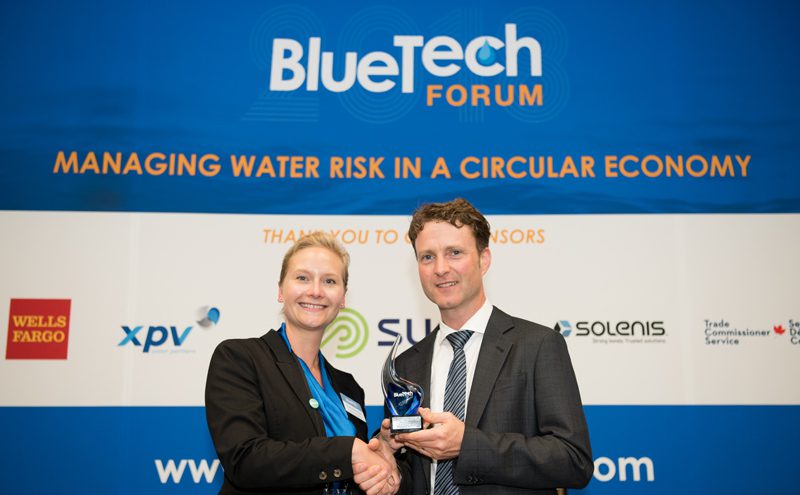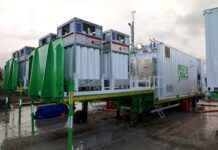
Technologies for wastewater treatment and plant optimisation were the winners of the Innovation Showcase at BlueTech Forum. The event attracted 200 delegates and took place in Vancouver, Canada on 6-7 June 2018.
Aquacycl, which is based in California, won Best Technology Innovation for its bioelectrical treatment technology – BETT – which can directly convert sewage to electrical energy without methane generation. Two pilot projects processing municipal and swine wastewater have demonstrated much faster treatment times than standard aerobic and anaerobic processes and a massive reduction in operating expenditure.
Canadian start-up Emagin won the Best Market Strategy award for its operational intelligence platform that enables utility operators to manage infrastructure in real-time. In a recent demonstration project with United Utilities in the UK, the platform leveraged machine learning to generate real-time pump schedules, minimising the cost of operations while guaranteeing compliance and maintenance requirements.
Paul O’Callaghan said, “BlueTech Forum has a strong track record of selecting technologies for the Innovation Showcase that go on to succeed in the global market. These two winning companies came from a very strong field and stood out for the exceptional efficiencies they can deliver in terms of both cost and energy, along with their scalability.”
Both technologies fit closely with the theme of this year’s BlueTech Forum, ‘managing risk in a circular economy’ and delegates heard many examples of companies exploring ways to reduce water use and recover and reuse a range of resources.
Around the world and into space
Menno Holterman, chief executive of Nijhuis inspired delegates with case studies from around the world where circular economy approaches are helping clients meet regulatory and cost requirements alongside resource efficiency. This included an energy-neutral anaerobic digestion plant for industrial wastewater in Egypt and a self-sustaining floating farm for 48 cattle in the centre of Rotterdam.
Space scientist Michael Flynn went much further afield, explaining how water recycling systems for astronauts travelling to Mars will have to be as dependable as the one built into the human body. “We’re focussing a lot on biomimetic technologies,” he said, “trying to get away from these machines that break down all the time.
“We have a project now where we’re developing a small intestine based water-recycling system, so a lot of our work is based on forward osmosis because that’s how the small intestine works. We’re also doing a lot of work developing living membranes that are self-cleaning.”
Digital and biotechnology were also on the agenda at the Forum, with Jens Kolind, chief executive of Novozymes telling delegates that applying biotechnology to wastewater treatment can reduce energy and chemical use, clean up biofilms and reduce sludge quantities. In a twist on the standard innovation pitch format, delegates also got to hear from 14 industrial end users, utilities and municipalities about their requirements for water technologies and services.
Disrupting technologies
Hans-Ulrich Buchholz, environmental compliance manager at cosmetics company L’Oreal, said the company is rolling out a ‘dry factory’ approach to reduce municipal water consumption across its production facilities and was now looking for “disrupting technologies that are more eco-efficient” to improve treatment processes and reduce energy consumption and waste.
Eddie Corwin, sustainability programme manager at Google said the tech giant was looking for ways to optimise water use within existing municipal structures for water supply and wastewater collection across its real estate portfolio. “Figuring out opportunities to go beyond efficiency within our operations and further reduce our potable water use is one of our biggest challenges,” he said.
Paul Knuckle, external funding lead for Severn Trent Water said the UK utility had five principle areas of need including tackling leakage, abstraction reduction, minimising supply interruptions and extracting more value from wastewater. “The fifth is around how we introduce technology,” Knuckle said, “especially artificial intelligence and the internet of things and how we make sense of big data and increase the efficiency of our operations.”
Future vision
Reflecting on the Forum, Paul O’Callaghan said, “We’ve had a really diverse group of people here at BlueTech Forum. Having the large strategic corporates here and the larger water technology companies is fantastic, each of those is part of this future vision for water.
“One thing that struck me was the degree to which corporate water end-users are providing solutions directly within their communities, whether that was Walmart or a mining company in Chile or Peru. They’re doing things sometimes that the utilities are unable to do and becoming part of the solution both within their own factories and within the communities in which they operate.
“Properly understanding and implementing the circular economy is key to delivering sustainable water infrastructure and processes across the world.”
The location of BlueTech Forum 2019 will shortly be announced, email sarah.condon@bluetechresearch.com for updates.
www.bluetechresearch.com.







